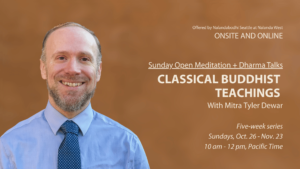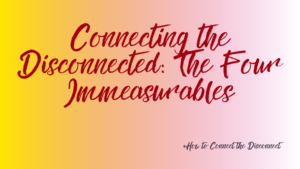At difficult times the appropriate Buddhist lesson often arises. Or is it the other way around – we hear a Buddhist teaching and life presents an opportunity to put it into practice? In my case, mind training showed up together with a challenging situation.
A new roommate had moved into the house. She seemed nice and pleasant. We shared a kitchen that was separated from my bedroom by a thin wall. I soon learned she enjoyed cooking, quite vivaciously and noisily, at six o´clock in the morning.
I worked late hours. Six was not a good time for me to wake up. “No problem,” I thought, “I´ll talk to her and we’ll find a solution.” But no. She told me rather harshly I would have to get used to her cooking habits and not be hypersensitive!
The conflict began. I woke up every morning, after a few hours’ sleep, to the banging of pots, the sizzling of hot oil, and (the worst part) her singing. Every day I grew more desperate and angry. She got more irritated and aggressive about my complaints, in turn. The atmosphere in the house – tense.
The emotions I was feeling toward this woman came close to what I consider as “hate.” Inwardly, I began calling her the “kitchen monster.”
About that same time, I started a beginning course in mind training at a local Buddhist center: “Changing adverse conditions into positive ones.” In my seemingly hopeless situation, that sounded good. With each new class, I began trying to immediately implement that wisdom in my daily meditation.
But it didn’t work. For quite a few sessions I sat on the cushion feeling that this was a mission impossible. After all, she was the one causing the problem. She should change! I was the one in the right; clearly I was the victim. I continued the mind training practice more out of desperation than conviction. But after a while, something began to change in my meditations. I opened up and saw things differently. I began:
- recognizing that mental afflictions were causing her to act as she did
- focusing on her positive qualities (yes, she had some!)
- trying to see her through the eyes of somebody who loved her
- feeling the harm I did to myself by getting so angry
- developing gratitude for the opportunity to practice in a real situation in my daily life.
It took me weeks, and lots of resistance, to overcome my negative feelings about her. After some time, I realized I was no longer so focused on a change in the outer situation. Instead, I was excited about the inner changes I could feel evolving.
As you may have guessed, without changing my conduct towards my kitchen monster, something shifted. The tension lessened. The noise from the kitchen decreased. Even when it was noisy, I slept longer in spite of it.
One day we exchanged a shy smile and started to speak again.
We shared the house for a few more years after that, not becoming the best of friends, but living together in a respectful and rather harmonious atmosphere.

Monika Sandmeier is retired and lives in Germany. An enthusiastic and experienced traveler, she has been a student of Ponlop Rinpoche and a Nalandabodhi member since 2012.






